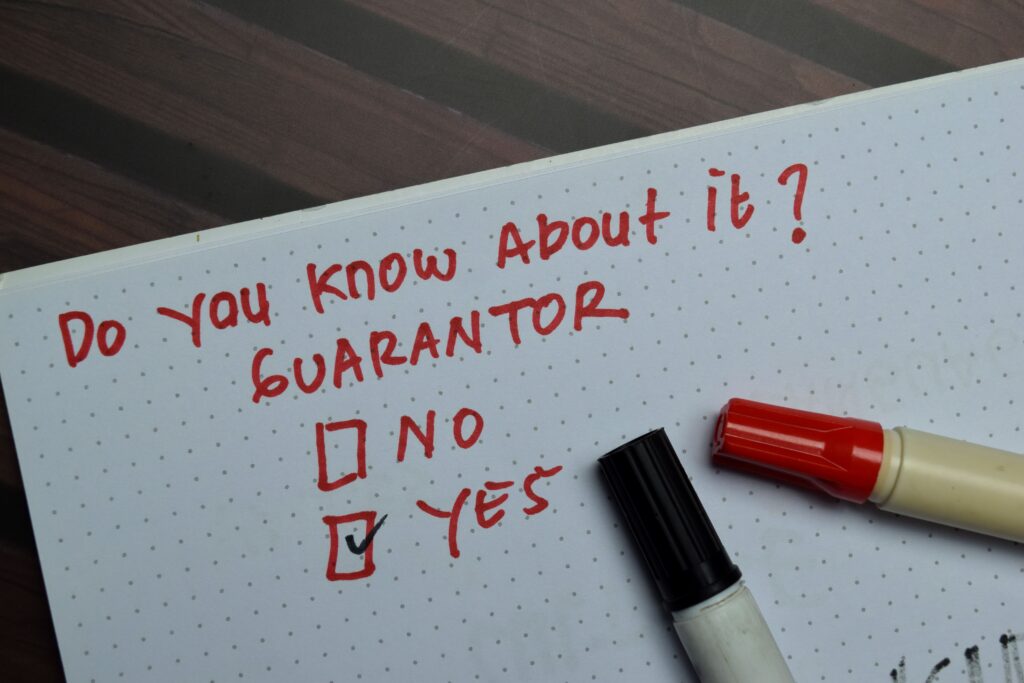When either taking a guarantor loan or deciding to become someone’s guarantor. There are both good and bad aspects of it you must consider. With poor or no credit history, considering this loan can never be a terrible option.
Just like you always make timely repayment of your unsecured personal loan to meet your financial obligations. This type of loan requires a friend, family member, or relative to guarantee to repay the loan if you cannot. What a guarantor loan is, how it works, etc are all-inclusive in this article.

What is a Guarantor loan?
A guarantor loan is the type of unsecured loan that needs a guarantor to pledge his or her assets as collateral. Besides that, a guarantor co-signs the credit agreement. And agrees to repay the borrower’s debt if the borrower defaults on agreed repayments.
How does a guarantor loan work?
Before dabbling into this type of loan, it would be really cool to understand how it works.
This loan works like the unsecured loans. The major difference is that the loan provider will need a guarantee that they will receive repayments. And this is where you will bring a guarantor.
Therefore, as part of its application, the guarantor promises to repay the loan if the borrower defaults.
Because this contract is legally binding to both the borrower and the guarantor. Both parties should give it a careful consideration before entering an agreement.
This type of loan suits people with a low salary. Besides that, anyone with poor or no credit history can access the loan. You can checkout How to get loans in Ghana without collateral.
If lenders usually turn down your credit request, this loan type could be the right option to try out. This is because lenders prefer to lend money to risky borrowers who have guarantors with a strong credit history.
This loan type attracts higher interest rates than personal loans that borrowers with good credit can get.
How can I get a guarantor loan?
Getting this loan is like securing a personal loan. It requires your guarantor to vouch that you will repay the loan.
The following is how you can get a guarantor:
- Find a guarantor who will support your loan application
- Compare the guarantor loans you can get
- Ensure you’re eligible for the lender’s criteria for the loan
- Consider other types of loans for your financial situation. Especially bad credit loans or loans from credit unions.
- Then apply for the loan.
When do banks give guarantor loans?
Sometimes banks give this loan, especially when they review a borrower’s loan application and credit history
And if the borrower has a bad or no credit history. Then they may condition the loan for a guarantor. Therefore, as a borrower, you will need a guarantor for the bank to complete the loan review.
Who can be my guarantor?
It is very important to know who can be your guarantor before applying for this loan. Most times, your immediate family members have to be your guarantor. However, some lenders could allow extended family members or an ex-spouse to be your guarantor. This varies across lenders, as it depends on the lender’s discretion.
What are the pros and cons of a guarantor loan?
Before getting this loan, you might want to know the pros and cons that come with it. When you weigh the pros and cons, you’ll definitely choose whether to take the loan.
The following are the pros of the loan:
- You can borrow more than you would have without a guarantor.
- There’s a higher chance of a successful loan application.
- It adds scores to your credit rating, especially when you repay the guarantor loan on time.
- It helps people with bad credit history to access loan.
The following are the cons of the loan:
- The interest rate it attracts is higher than the standard personal loan.
- Bear the shame of having an embarrassing financial conversation. Where you discuss your poor credit rating so that someone will be your guarantor.
- If you cannot repay the loan timely. They’ll alert your guarantor, and this can affect your credit score and that of your guarantor.
- Upon your failure to repay the loan. And if your guarantor gets to repay the loan, it might strain the relationship both of you have.
Conclusion
Even a quick loan to meet your needs requires you to have a good credit rating. But because borrowers rarely have great credit ratings. The guarantor loan offers the option whereby bad credit borrowers can provide people who will vouch for them. Without these guarantors, the lenders consider such borrowers as high risk. Because of this, they will not access any form of loan. Ultimately, the guarantors provide extra security to the lenders of the loans. This gives the lenders the assurance that they will receive the repayments of the loan from the borrowers.